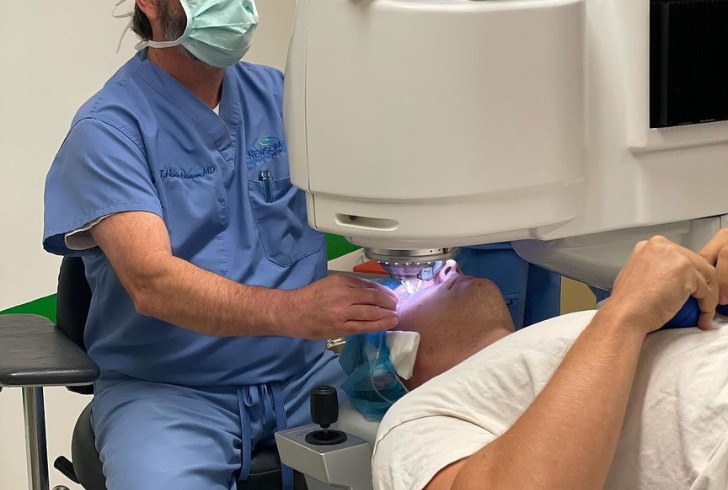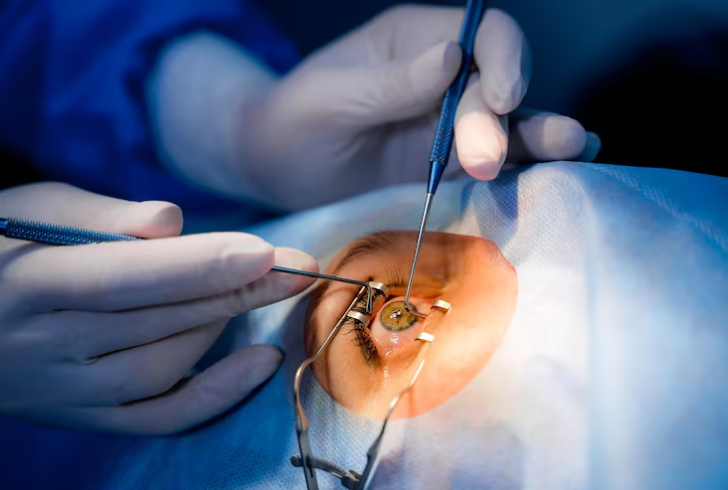
Does LASIK Surgery Hurt?

LASIK eye surgery has revolutionized vision correction, offering freedom from glasses and contact lenses. But for many considering this life-changing procedure, one burning question remains: Does LASIK surgery hurt?
Let’s dive into the facts and dispel the myths surrounding this popular vision correction method.
Understanding LASIK
Contrary to common fears, LASIK (Laser-Assisted In Situ Keratomileusis) is typically a pain-free experience. The procedure uses advanced laser technology to reshape the cornea, improving focus and clarity. But how does it feel during and after the surgery?
The LASIK Experience

Instagram | newsomeye | LASIK surgery is generally painless with minimal discomfort reported after the procedure.
The LASIK Procedure
LASIK surgery is remarkably fast and straightforward. Here’s what happens:
-
Eye Numbing – Before the procedure begins, your ophthalmologist will administer eye drops to numb your eyes. This ensures that you feel no pain during the surgery.
-
Creation of a Corneal Flap – A specialized laser, known as a femtosecond laser, is used to create a thin, hinged flap on the surface of your cornea. This flap is carefully lifted to expose the underlying tissue.
-
Reshaping of the Cornea – Another laser, called an excimer laser, is then used to reshape the exposed corneal tissue. This reshaping corrects the refractive errors that are causing your vision problems.
-
Repositioning of the Flap- Once the reshaping is complete, the corneal flap is gently repositioned back into place. Your body’s natural healing process will help to seal the flap in place.
The entire process usually takes less than 30 minutes for both eyes. Most patients return to their normal activities within a day or two.
Potential Complications
While LASIK is generally safe, it’s important to be aware of potential risks:
- Infection (very rare)
- Corneal flap complications
- Temporary vision issues like halos or starbursts, especially at night
- Dry eyes
- Under or overcorrection, which may require glasses or contacts
It’s crucial to follow your doctor’s post-operative instructions to minimize these risks.
LASIK vs. Other Vision Correction Methods
LASIK stands out for its minimal discomfort compared to other vision correction procedures. Unlike contact lenses, which can cause daily irritation, or glasses that can be cumbersome, LASIK offers a long-term solution with a brief recovery period.
Who’s a Good Candidate for LASIK?
LASIK is a viable option for many people, but it’s important to consider several factors before deciding. If you’re over 18 years old, your vision prescription has remained consistent for at least a year, and you have no major eye health concerns, LASIK might be a suitable choice.
However, individuals who are pregnant or nursing should avoid the procedure. To ensure LASIK is the right fit for you, it’s crucial to consult with an eye care professional for a thorough evaluation.
The Long-Term Benefits of LASIK

Freepik | megafilm | LASIK surgery is mostly pain-free but may cause temporary side effects like dry eyes and night-time vision issues.
While the initial question “Does LASIK surgery hurt?” is important, it’s equally crucial to consider the long-term benefits:
- Improved vision without dependence on glasses or contacts
- Enhanced quality of life
- Potential cost savings on vision care over time
Many patients report high satisfaction rates years after their LASIK procedure.
Preparing for LASIK
To make your LASIK experience as comfortable as possible:
- Choose a reputable surgeon with extensive experience
- Discuss any concerns or anxieties with your doctor
- Follow pre-operative instructions carefully
- Arrange for someone to drive you home after the procedure
- Prepare a comfortable recovery space at home
A Clear Path to Better Vision
So, does LASIK surgery hurt? The overwhelming consensus is no. While you may experience some mild discomfort, the procedure itself is generally pain-free. With its quick recovery time and long-lasting results, LASIK offers a clear advantage for those seeking freedom from glasses and contacts.
Remember, every individual’s experience is unique. If you’re considering LASIK, consult a qualified eye care professional to discuss your options and determine if it’s the right choice. With proper care and expectations, LASIK can open your eyes to a world of clearer, sharper vision.
More in Health & Fitness
-
`
Simple Steps to Make the Philadelphia Cheesecake Recipe
If you’re looking to make a dessert that never fails to impress, this Philadelphia cheesecake recipe is your go-to. With its...
August 21, 2024 -
`
How Much Does It Cost to Travel in Europe?
Dreaming of strolling along the Seine in Paris, exploring ancient ruins in Rome, or sipping sangria on a Spanish beach? Europe’s...
August 13, 2024 -
`
Mahershala Ali and Amatus-Sami Karim’s Decade-Long Marriage
Who is Mahershala Ali married to? This question often arises when discussing the acclaimed actor. Mahershala Ali, the talented and versatile...
August 5, 2024 -
`
Is It Normal to Be Sore After a Massage? 9 Ways to Relieve Soreness
Is it normal to be sore after a massage? Many people schedule a massage to drift into a state of relaxation...
August 3, 2024 -
`
Delicious Pescatarian Breakfast Ideas
Exploring new breakfast ideas can be a delightful way to start your day, especially when they align with a pescatarian diet....
July 24, 2024 -
`
Is Phuket Worth Visiting in 2024?
Phuket, Thailand’s gem of an island, has long attracted travelers with its pristine beaches, lively nightlife, and cultural treasures. The question...
July 19, 2024 -
`
What is the Best Way to Melt Chocolate for Any Recipe?
Chocolate is a beloved ingredient in many desserts, from ganache and cake batters to decadent drizzles over ice cream. Knowing what...
July 12, 2024 -
`
How to Plan a Backpacking Trip Like a Pro in 16 Steps
Planning a backpacking trip can be as thrilling as it is daunting, especially if you’re keen to make every moment count....
July 5, 2024 -
`
How to Build Fast-Twitch Muscles in 5 Simple Steps
Have you ever wondered how to build fast-twitch muscles? These powerful muscle fibers are key to explosive strength and speed. Whether...
June 20, 2024















You must be logged in to post a comment Login